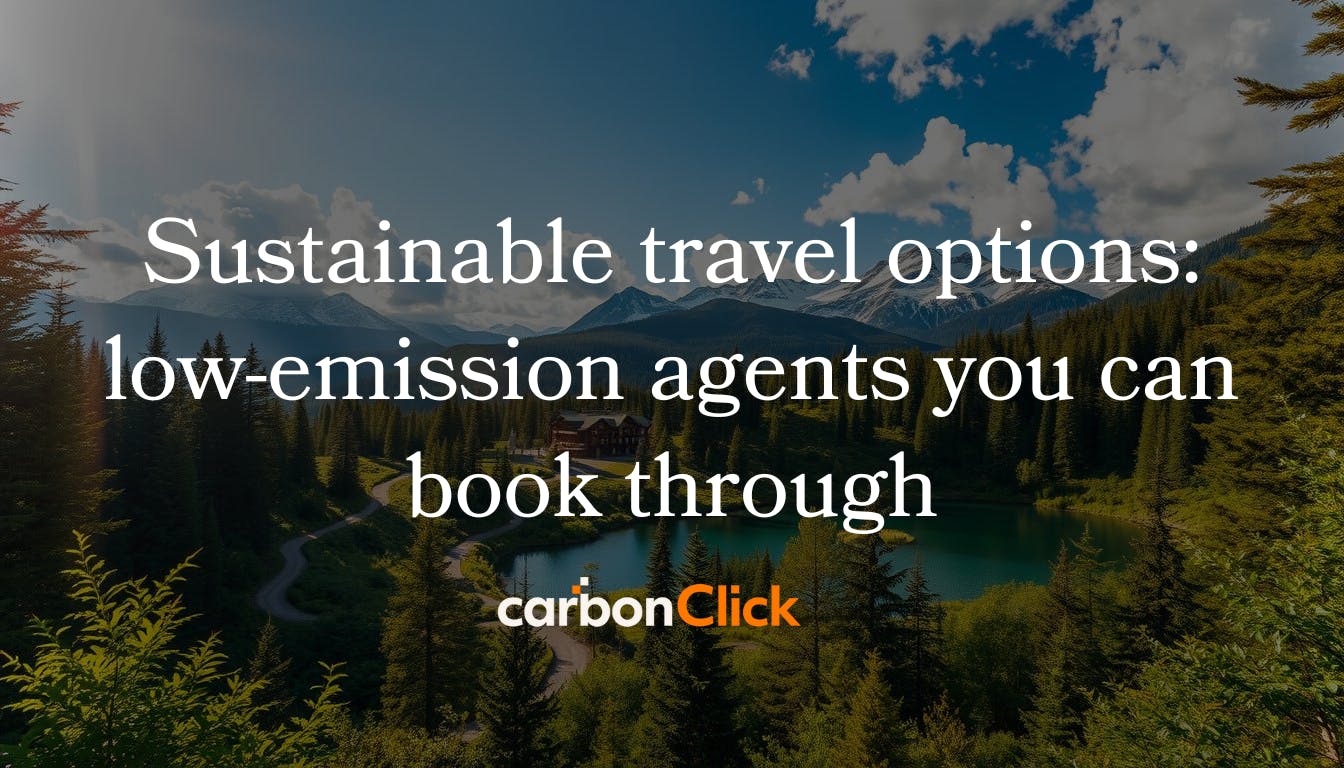Sign up. Be inspired. Get clicking.
Sustainable travel options: low-emission agents you can book through
3 April 2025
Planning environmentally conscious trips has become increasingly accessible. Many companies now focus on reducing their environmental impact by managing emissions. In 2007, Natural Habitat Adventures pioneered the way as the first fully carbon-neutral organisation in this field.
These providers assess the emissions from both their trips and offices, investing in projects such as renewable energy or tree planting to offset them. Some even factor in flight emissions as part of their calculations.
Destinations like the Galapagos, Alaska, and African safaris are prominent in these itineraries. By collaborating with organisations like WWF, these companies ensure that conservation remains a central focus. As they have expanded their offset initiatives, some businesses report a 300-400% increase in total emissions management.
The range of options includes everything from small eco-lodges to large adventure operators, each adhering to rigorous standards to validate their sustainability claims. This makes it easier for travellers to select responsible and impactful experiences.

The carbon issue: how travel impacts climate change
Global tourism's carbon footprint has expanded significantly, now comparable to the emissions of entire nations. Aviation alone contributes approximately 2-3% of global CO₂ emissions, and projections indicate a 25% increase in tourism-related emissions by 2030. Without substantial changes, the industry's impact will intensify climate change and lead to further habitat loss.
The surge in travel following the pandemic adds additional pressure. While forecasts predict a full recovery by 2025, current practices continue to strain ecosystems. Over-tourism results in wildlife habitat destruction, with monitored vertebrate populations experiencing an average decline of 69% since 1970, cultural erosion in overcrowded destinations, and resource depletion in local communities.
Adoption of sustainable aviation fuel (SAF) remains disappointingly low, accounting for just 0.3% of global jet fuel production in 2024. This slow progress underscores the necessity for alternatives such as rail travel or extended stays.
Every journey leaves a lasting environmental impact. Opting for environmentally certified accommodations or travelling during off-peak periods can help reduce this effect. The objective is to harmonise exploration with conservation.

Why choose low-emission travel agent services?
Third-party verified carbon offsetting ensures genuine reductions in environmental impact. Certifications such as Gold Standard and Verified Carbon Standard validate every ton accounted for, with rigorous auditing preventing misleading claims.
The process involves three key steps:
- Measuring all emissions, from travel-related activities to office operations.
- Reducing emissions through efficient logistics and strategic partnerships.
- Offsetting remaining emissions via certified projects.
Since 2007, more than 68,000 tons of emissions have been addressed across six continents. Projects include renewable energy initiatives and forest conservation efforts, delivering wider benefits to local communities.
The most effective approach considers often-overlooked emission sources, such as staff commutes, supply chains, and even website hosting. Some organisations apply a 15% buffer to account for unmeasured impacts.
Using specialised offsetting services is more effective than handling the process independently, as they conduct complex calculations and ensure project credibility. Ethiopia’s cookstove initiative, for example, demonstrates how targeted efforts can lower emissions while improving public health.
How carbon-neutral travel works
Analysing trip-related carbon emissions helps identify where reductions are most effective. Companies such as Natural Habitat Adventures and Intrepid track every aspect, from flights to meals. Their data indicates that 74% of emissions stem from transportation, 18% from accommodation, and 8% from activities and food.
DEFRA-based calculations assess the impact of air, land, and sea transport, factoring in fuel type, travel distance, and occupancy levels. For instance, a half-full bus emits more per passenger than a train.
Projects designed to offset emissions must meet strict additionality requirements, demonstrating that reductions would not occur without financial backing. Natural Habitat Adventures’ Sumatra geothermal initiative, for example, prevents 92,000 tons of CO2 emissions annually by replacing coal-fired power plants.
South Pole’s portfolio includes over 700 projects across 50 countries, ranging from wind farms to methane capture. Meanwhile, Tomorrow’s Air pioneers direct air capture technology to remove carbon dioxide from the atmosphere.
Not all offset initiatives meet required standards. Unverified forest conservation efforts, for example, may lack long-term effectiveness. However, Gold Standard-certified projects align with UN objectives, supporting clean energy development and poverty alleviation.


Leading the way: pioneers in carbon-neutral adventures
Innovative travel companies are redefining responsible tourism by combining conservation efforts with unforgettable experiences while minimising environmental impact.
Natural Habitat Adventures collaborates with WWF to offer over 100 wildlife-focused journeys across six continents, from tracking polar bears to exploring the Amazon. Each trip contributes to species conservation and supports local communities.
Indagare’s Impact Fund has directed more than $150,000 towards Zimbabwe’s Long Shield Lion Guardians initiative, which protects lions while creating educational and employment opportunities for rural communities.
Intrepid Travel takes steps to reduce emissions across its offices, remote work operations, and supply chains. Their initiatives include investments in renewable energy and waste reduction strategies.
Certifications such as B Corp and Climate Neutral provide independent verification of these efforts. Natural Habitat Adventures has established lodging standards through its 24 NSF-certified lodges and partnerships with 78 LEED-certified accommodations. Additionally, their Tomorrow’s Air initiative integrates biochar technology with traveller education.
The Adventure Travel Trade Association (ATTA) brings the industry together through its Climate Action Plan, demonstrating that sustainability and exploration can successfully coexist.
The real impact of your sustainable trip
Numbers highlight the tangible impact of responsible travel initiatives. The reduction of over 68,000 tons of carbon emissions is equivalent to removing 14,672 cars from the road, while also helping to protect 459 acres of forest each year.
Data from the past decade reflects steady progress, with offset volumes increasing by 7% annually between 2013 and 2023. Notable achievements include:
- Preventing the equivalent of 169 million gallons of fuel consumption through emission reductions.
- Safeguarding 18,000 hectares of land through Cambodia’s cookstove initiatives.
- Supplying clean energy to 56,000 homes via Sumatra’s geothermal project.
- Achieving 89% guest participation in Indagare’s community support programmes.
- Directing 93 cents of every dollar towards WWF’s field conservation efforts.
If 20% of travellers opted for certified low-impact options, global emissions could decrease significantly. Each journey influences both energy systems and ecosystems, creating long-term positive effects.


Extend your commitment: reduce the impact of personal travel too
Reducing the impact of flights and trips does not have to be complicated. Tools such as South Pole’s emissions calculator make the process straightforward. For example, offsetting a flight from Los Angeles to New York (LAX-JFK) costs around $23—similar to the price of a checked baggage fee.
Airline initiatives vary significantly. While more than 45 carriers offer offset options, independent platforms like Cool Effect and MyClimate often provide greater transparency. Terrapass, for example, funds a mix of renewable energy (60%), forestry conservation (30%), and technological carbon removal (10%) to ensure a well-rounded approach.
Key considerations include:
- Verified projects – Initiatives such as Adani’s solar programme meet Gold Standard certification.
- Corporate matching – Twelve major employers, including Microsoft, match employee contributions to emissions reduction efforts.
- Tax incentives – In some cases, the IRS allows carbon credit purchases to qualify as charitable contributions.
Natural Habitat Adventures’ staff lead by example, with 94% voluntarily offsetting their personal travel. Additionally, partnerships like 4AIR’s Aviation Climate Fund enable investment in Sustainable Aviation Fuel research.
Taking the first step is simple. Small efforts add up, creating a meaningful impact when widely adopted.
Your next adventure awaits—sustainably
Discover breathtaking destinations while contributing to conservation efforts. Natural Habitat Adventures offers over 100 WWF-endorsed trips designed for environmentally conscious travellers. New itineraries for 2026 include trekking in Bhutan and electric boat safaris in the Amazon.
Highly rated experiences feature Churchill polar bear expeditions and Galápagos cruises powered by solar energy. Each journey includes verified emissions reduction documentation and expert guidance from WWF specialists. A dedicated 24/7 travel consultant is available to help personalise your experience.
An impressive 78% of participants return for additional responsible travel experiences. A digital catalogue is available, showcasing 46 carefully selected lodges designed with sustainability in mind. Natural Habitat Adventures is also working towards sourcing 100% renewable energy across its supply chain by 2030.
Start planning your journey today. Thoughtful travel choices can have a lasting impact on both people and the natural world.
17 South Street
Auckland 1010
New Zealand
info@carbonclick.com- -
- X
Subscribe now to stay up to date with CarbonClick, carbon offsetting and climate action.
By signing up you agree to our Privacy Policy.


